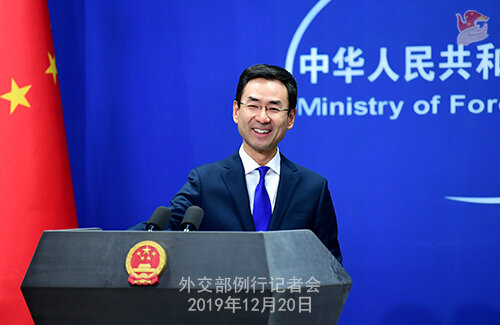‘China, Europe support implementation of nuclear deal’

Chinese Foreign Ministry spokesperson Geng Shuang said on Friday that China and Europe support implementation of the 2015 nuclear deal, officially known as the Joint Comprehensive Plan of Action.
“China and Europe, as two major forces for multilateralism, agreed to strengthen communication and coordination, carry out the consensus reached at the Foreign Ministers' Meeting on the Iranian Nuclear Issue in September, and ensure the full and effective implementation of the JCPOA,” Geng told a press conference, according to the Chinese Foreign Ministry website.
He added, “Both sides support diplomatic mediation efforts and stand for resolving compliance issues through consultation within the JCPOA Joint Commission. We stand ready to work for the easing of tensions to uphold the international nuclear non-proliferation regime as well as peace and stability in the Middle East.”
Ali Shamkhani, secretary of Iran’s Supreme National Security Council (SNSC), said on Wednesday that if the Europeans fail to fulfil their commitments under the nuclear deal, Iran will have no choice but to continue reducing its commitments to the pact in order to create a balance.
Josep Borrell, the new EU foreign policy chief, said on December 7 that “collective responsibility” is needed to stop the JCPOA from breaking apart.
“We have a collective responsibility to preserve #IranDeal,” Borrell tweeted.
U.S. President Donald Trump quit the nuclear deal in May 2018 and introduced the harshest ever sanctions on Iran as part of his administration’s “maximum pressure” campaign against Tehran.
Under the JCPOA, Iran promised to put limits on its nuclear activities in exchange for the termination of economic and financial sanctions.
On May 8, exactly one year after the U.S. abandoned the deal, Tehran announced that its “strategic patience” is over and began to partially reduce its commitments to the agreement at bi-monthly intervals.
Iran’s moves are based on paragraph 36 of the JCPOA which “allows one side, under certain circumstances, to stop complying with the deal if the other side is out of compliance.”
In the first stage, Iran announced that it will not limit its stockpile of the nuclear fuel to 300 kilograms allowed under the deal. On that date (May 8) Iran’s Supreme National Security Council (SNSC) said if the remaining parties to the JCPOA, especially Europeans, devise a mechanism to protect Iran from the sanctions’ effect in the two-month deadline it will reverse its decision.
But since European parties missed the deadline, on July 7 Iran announced that it has started enriching uranium to a higher purity than the 3.67%, thereby starting the second step.
Again, as Europe missed the second 60-day deadline, Iran moved to take the third step, removing a ban on nuclear research and development (R&D).
In the latest step, which started on November 6, Iran began injecting uranium gas into 1,044 centrifuges at the Fordow nuclear site. It was done at the presence of inspectors from the International Atomic Energy Agency (IAEA).
Iran has said it will reverse its decision if its economic interests are guaranteed.
NA/PA
